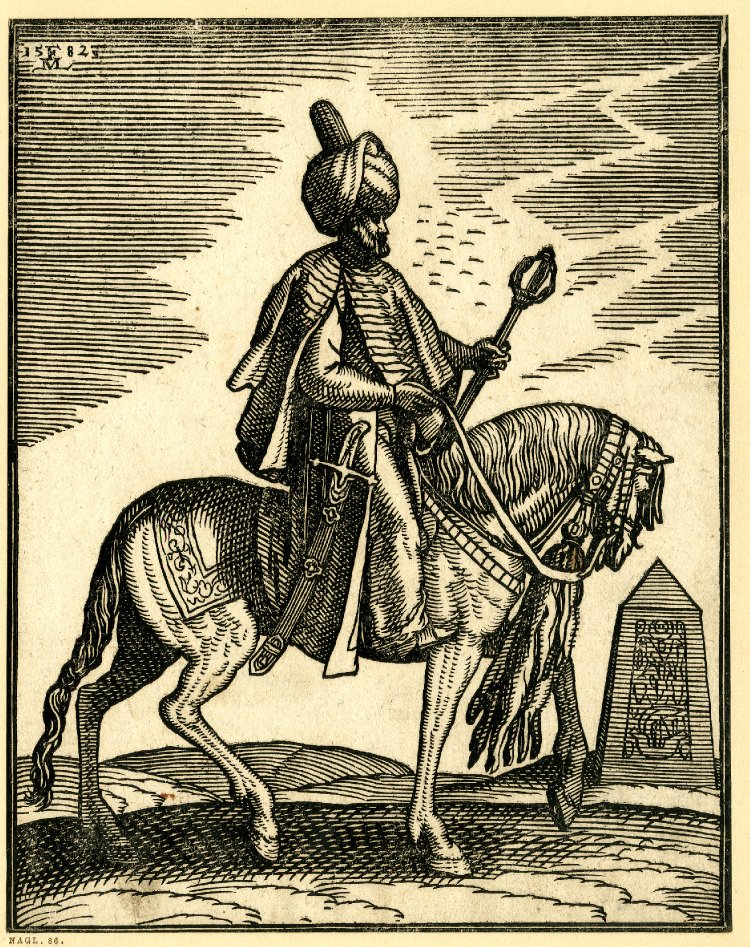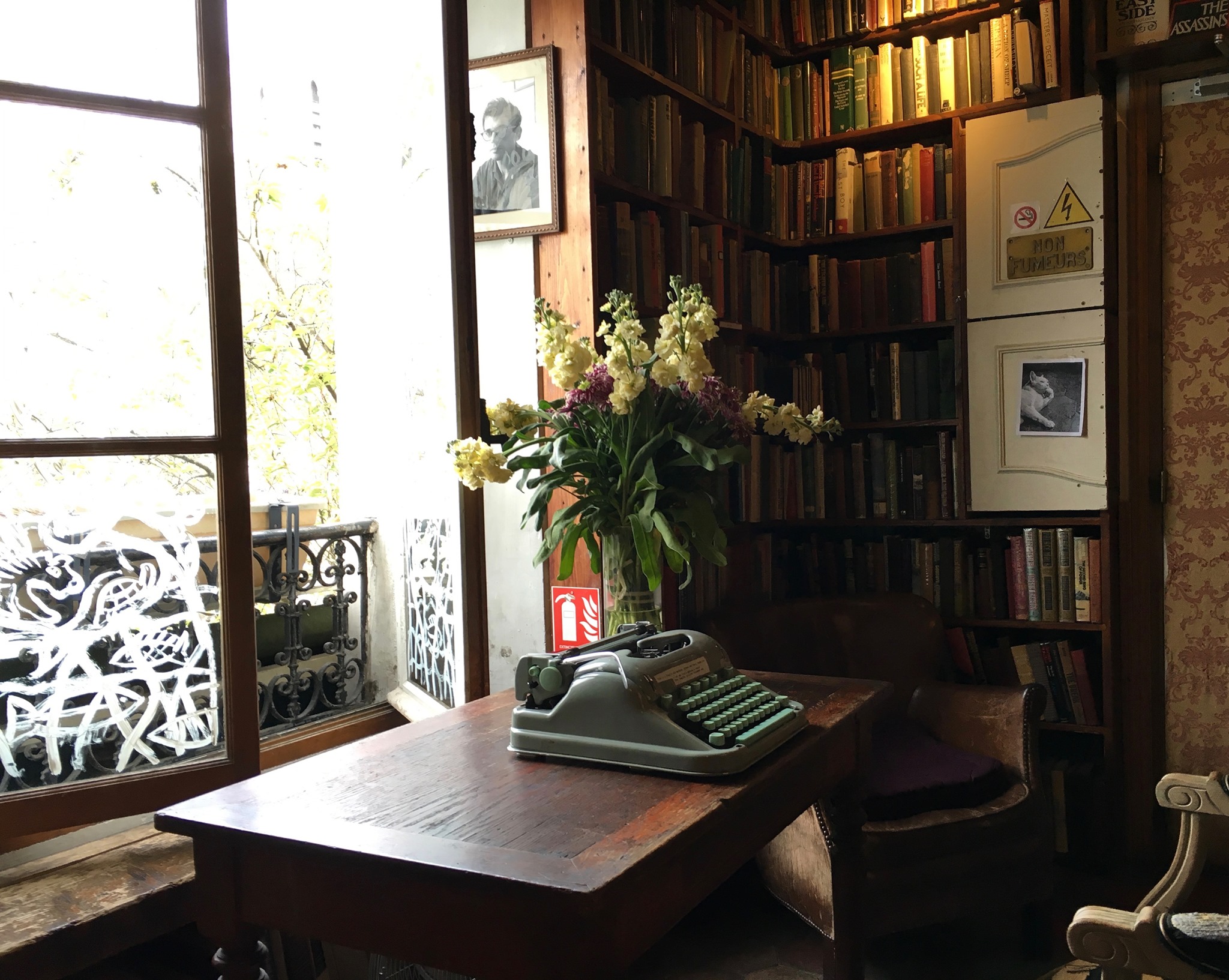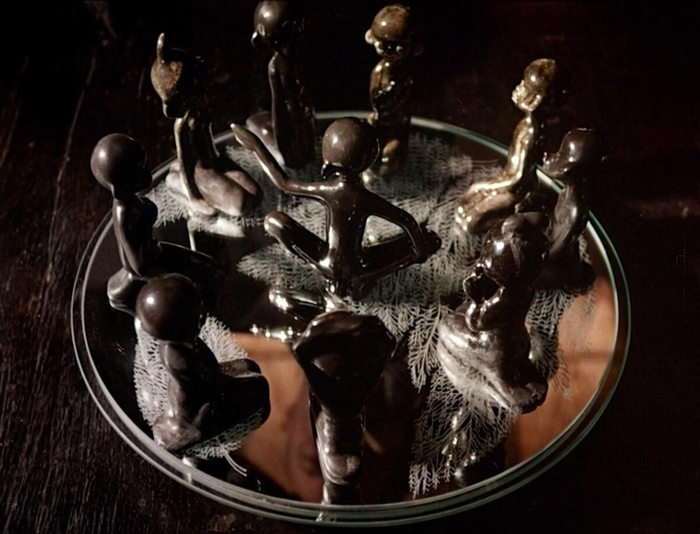
He awoke, though it was not awakening, for the dream had not left him, clinging to his bones as if he had never lain down, as if the night had been nothing but a shallow pretense, and the gray mist of the Balkan morning seeped through the ragged canvas of the camp tent, damp, heavy, smelling of wet earth and horse, and beyond the canvas rose the clamorous preparations of men whose voices were sharp, strident, each syllable a hammer striking the rhythm of a world he no longer belonged to, yet he could not hear them, could not take them in, because his mind had already fled, had already run through a forest that was no longer a place but a corridor of time in which he was again a child, hand in hand with the one person who had ever been wholly real to him, his mother, eyes wide with terror, hair matted with mud, dragging him past brambles that tore at skin and cloth alike, past trees whose branches bent under the centuries of sorrow that seemed almost to breathe, and he ran because running was all he knew, because fear and love had fused into one motion that could not stop, because he could feel in every nerve the iron boots of the Sultan’s men closing in, brushing the edges of his mind with shadows, and he knew they would catch him if the dream permitted, if the night’s story allowed a conclusion, but it never did, and he opened his eyes to a world no less terrifying than the one from which he had been plucked, for he was no longer a child, yet the child’s fear, the child’s hope, the fragile and terrible conviction that something—anything—might still be possible, remained lodged in his chest like a stone that refused to be dislodged, lodged with the memory of that girl, glimpsed once in the empire’s training halls where they had taught him to obey and to strike, to serve and to deny himself even the most secret joys, her eyes soft with a kindness he could never claim, her smile a quiet torment that spoke of another life, another world that might have existed if the universe had not conspired so relentlessly to take him from home, to take his mother, to make him into a machine of obedience, to steal from him even the possibility of love, and all around him the camp began to stir, men moving with the precision of automatons, voices rising and falling in the crude music of orders and obedience, but he could not move with them, could not obey, could not partake in the rituals of death and preparation, because the world had shrunk to the forest, to the running, to the touch of his mother’s hand pulling him toward a fleeting, impossible safety, and the campaigns, the campaigns that had stained his hands with blood, each one a door opening into corridors of horror and futility, yet he had survived, endured, and still the thought arose, impossibly, fragile, cruel as a whisper, that he could one day run not because he was forced but because he chose, that the forests of memory might one day become forests of freedom, and he drew a long, sharp breath, tasting the damp canvas, the sweat of horses, the smell of earth, and somewhere beneath the trained muscles, beneath the body that had been drilled to obey and to kill, something stirred, a ghost, a child, a shadow, whispering that there might exist a path beyond the sword, beyond the orders, beyond the girl he could never touch, beyond the mother he could never protect, and outside the tent the camp roared, the sounds of war and preparation cascading endlessly, yet he did not rise, did not move to meet them, for the forest, eternal, infinite, hung in the air, in the blood, in the memory, and perhaps, he thought with slow, terrible joy, perhaps the path to it was no longer only in dreams.
He stepped from the tent, being pulled by the inevitability of the day, by the inertia of a life imposed, and the camp sprawled before him like a city of bones and smoke, men and horses moving in rhythms at once familiar and alien, and he moved through them as through water, each step heavy, each breath a labor, while the memory of his mother ran beside him, hand in hand, eyes wide, urgent, pulling him through brambles and mud, and that girl’s impossible face, fleeting, kind, cruelly distant, flashed at the corners of his mind, a reminder of the life denied, the joy forbidden, the possibility glimpsed but never claimed, and the orders shouted by sergeants reached him only as vibration, as pressure in the chest, because he could not obey, could not raise his sword, could not participate in the killing the Sultan demanded, and the battlefield awaited, mud, blood, fear, men he had known vanishing in screams, and through all of it the forest had waited, had never vanished, had never abandoned him, though he had abandoned it for decades, and the thought arose, slow, terrible, suffocating, that he could run, that he could vanish into the trees, that the impossible might be possible, though the path was invisible, though the men around him were shapes of inevitability, though the armor pressed and weighed, chainmail cutting into skin as if the body itself conspired against him, and the girl’s eyes flashed once more, brief as lightning, enough to make the world tilt, to remind him that there was something beyond death, beyond duty, beyond fear, something fragile, trembling, a thread of life that might be claimed if he could only dare, and the orders came faster, horns blaring, drums pounding, men surging, and he moved with them, but not fully, not willingly, as a shadow, a ghost of a man, and somewhere in the depths of his mind, the forest whispered, infinite, patient, waiting for him to decide, to break, to run, to choose, waiting for him to step outside the world of men, outside the fate imposed, outside the campaigns, the Sultan, the blood, the girl he could not hold, the mother he could not save, and he felt, as he always felt when he remembered that forest, the impossible hope that perhaps, if he only moved, if he only rode, if he only ran, he might finally be his own, might finally claim a life, however fragile, however fleeting, that belonged not to the Sultan, not to the army, not to the inevitabilities of history, but to himself alone, and every shout, every clash, every scream measured the distance to that freedom, measured the distance to the forest, to the child who had once run beside his mother, to the boy who had glimpsed love in a world that forbade it, and the possibility existed, like a splinter of light in unending darkness, and he moved through the chaos, each step and breath a prayer, a refusal, a quiet assertion that he could choose, that perhaps he could, at last, step outside the relentless machine that had claimed him, and somewhere, waiting, eternal, patient, the forest hung, infinite, indifferent, and he felt that only by moving toward it, only by daring, could he become what he had always been.
He stood at the edge of the camp, armor pressing into him like a second skin, like the walls of a cage made not of iron but of years, of training, of the inevitability of being a janissary, and he realized, with a clarity both terrifying and exhilarating, that he could run, that he could step outside the world imposed on him since childhood, when the Sultan’s men had torn him from home, from his mother, and made him into a shadow of himself, and for the first time the thought did not terrify him but lit him with a strange, fragile hope, and her face came to him then, that girl, her eyes had shone soft, bright, impossible, a life denied, a possibility that could never be claimed, yet the memory of her, the ache of her impossible existence, lent urgency to every heartbeat, every muscle, every motion he had learned to suppress, and the camp, the men, the orders, became a background hum, a tide to flow through, not against, and he moved, silently, carefully, letting the rhythm of his breathing and the weight of the armor and the pulse of the forest already thrumming in his mind guide him, and he stepped into the stables, where horses snorted, restless, sensing his mind, and mounted one with the care of a man awakening to a life not yet his own, and the animal shivered beneath him as if it, too, remembered the forest, as if it, too, understood that the only act that mattered was not obedience, nor the sword, nor duty, but movement, the act of claiming a life beyond the world’s claim, and he urged it forward, slowly at first, feeling each pulse of muscle, each beat of hoof on wet earth, feeling the rhythm of mud and moss beneath, the scent of pine and decay, and behind him rose the horn, the shouting, the realization of men who had not yet noticed that one had refused, yet thrill and terror coiled together in his chest, indistinguishable, as though they were one living thing, and he leaned forward, letting the horse choose, letting the rhythm, infinite, relentless, hypnotic, carry him, and the branches clawed at him, the mud sprayed his boots, the leaves whipped his arms, and always, at the edges of his mind, she lingered, impossible, bright, tender, a reminder of another world, of the life denied, of a heart unclaimed, and yet she did not sadden him, she sharpened the urgency, and the forest welcomed him, twisted, dark, patient, and he realized, with a thrill so sharp it cut through years of fear and obedience, that the act of leaving, of refusing, of moving by his own will, was the only thing that could make him whole.
He rode, and rode, and the forest received him, folded him into itself, breathed with him, and the shouts, the horns, the men, the inevitabilities receded, becoming rhythm, pulse, memory, and for the first time he was not soldier, not boy taken from home, not a shadow of obedience, but a man, trembling, fragile, wholly himself. The forest swallowed him, patient, eternal, as if it had waited across years for him, for the moment when the child and the man, the soldier and the boy, the impossible loves and the impossible losses, would converge, trembling, alive, moving finally by his own will, and the horse beneath him, muscles shifting, pulse of hoof on earth, seemed to understand that the only act of consequence was existence, choice, movement, and he leaned forward, letting rhythm, relentless, infinite, carry him through shadows that bent and folded, roots that threatened, branches that clawed, and he could not tell where the world ended and he began, memory ended and reality started, past ceased to demand obedience and present allowed him the one possession he had ever truly wanted: freedom, unmeasured, unpromised, undeserved, yet wholly his, and he thought of his mother, of her eyes wide with terror and hope, of her hand in his, of the mud and brambles, and he thought of the girl, impossible, bright, her life denied, and he realized all of it—the loss, the longing, the campaigns, the inevitabilities—remained with him, not as chains but as echoes, proof he had existed, that he had loved, that he had endured, and he breathed, letting the forest fill him, the silence that followed the chaos, and understood that freedom was neither final nor safe, yet it was real, tangibly real, pulse of his heart, whisper of leaves, tremor of life, and leaning forward, letting horse carry him, letting the trees pass like pages of a book read decades without knowing the end, the world contracted behind him—horn, shouting, men, battles, inevitabilities—fading into almost nothing, and he allowed himself to think only of riding, moving, inhabiting a life that belonged to no one but him, and somewhere deep in the endless green, in rhythm of hooves and breath, he felt a tremor of something impossible, unspoken, unshareable, the joy of having outrun not men, not armies, not fate itself, but the weight of everything that had claimed him, and the forest, infinite, eternal, received him as if it had never doubted, as if it had always known, and for the first time truly, he was free.




